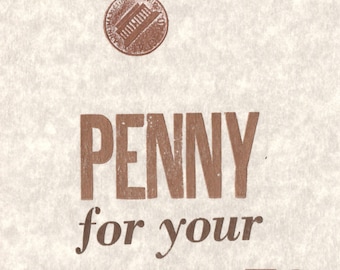

Similarly, in the Twelve Laws of Karma, the fourth law is the Law of Growth. In the field of neuroscience and Cognitive Behavioural Therapy (CBT), the 3 elements of Thought, Emotion and Behaviour are connected and affect one another. Also, our thoughts are not always based on reality or facts, because of many reasons including distortions, beliefs, assumptions, and biases. Our inner-voice, self-talk and mental health have received much attention these days. However, experts believe that each person has 50,000 to 80,000 thoughts a day. It's a phrase that you say to someone when you want to know what they're thinking or are genuinely concerned about them as they might look a little disheartened.A penny may seem like a small price to pay to know what’s on your mind. You often tell someone "a penny for your thoughts" when you want to know what they're thinking about. However, I don't hear it used much anymore. July 28, - You can use the phrase several different ways and as the article states, when it first originated a penny was worth a lot more. I agree with you that it's more used now whenever someone is concerned about another person rather then just asking their opinion - like it was originally intended. July 28, - Saying, "A penny for your thoughts," is like asking, "What's on your mind?" That is the simplest way to think about it. Our thoughts are really the only thing we own, as such, making them extremely valuable to someone who wishes to also own them. I find often when your down and someone asks what's wrong I always say nothing, or when someone asks how I am, I always say good, but when someone says to me "A penny for your thoughts," it makes me think about the answers I give and even if I didn't intend to open up to the person talking to me when they say something that makes me think, I almost always do. Where I live not many people say "Penny for your thoughts," but when people do say it they tend to just want to know what's on your mind. On the contrary, it would probably discourage them.



If this idiom had been coined today, it would have meant something different and it certainly wouldn't have encouraged anyone to share their thoughts. A penny has no value these days, people don't even bother to pick pennies up from the ground. It's so obvious that this idiom is not new. I just hope that they don't misunderstand this saying and think that it implies their thoughts are worth little.ĭid the phrase "my two cents" come from this idiom? They sound very similar. I heard "a penny for your thoughts" in a song recently, so the new generation is familiar with this saying. It shows that you care for them, it's nice. In fact, you're even willing to pay them for it. I agree with the other comment here that this is a great idiom because it truly shows that you have a vested interest in what the other person is thinking. If the estimation is correct, that's not bad at all. I think I had once seen a calculation of what a penny would have been worth back then, and the writer estimated that it would have been around $40 today. March 8, There is no exact date for this idiom, but it's supposed to have come about between 1400s and 1600s. You should understand the mention though to define the difference in the two. Just because it is a conversation piece, rhetorically mentioning currency doesn't make them similar. "Two cents" is more an offering of an opinion. A rhetorical offering of money shows genuine commitment to listen and to lend an ear to someone who appears to be bothered or upset by something on their mind. "Penny for your thoughts" is a polite gesture to listen to someone and show concern.


 0 kommentar(er)
0 kommentar(er)
